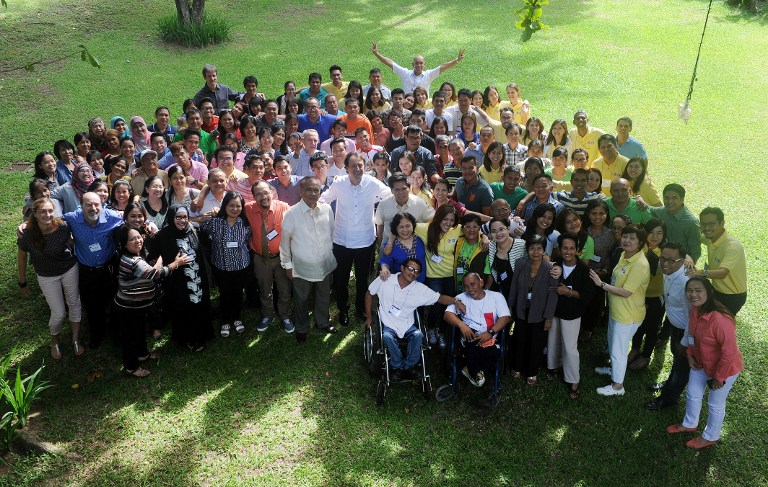Climate debate takes global pulse

Participants attending a climate debate forum titled “World Wide Views on Climate and Energy” pose for a group photo in Manila on June 6, 2015. From the typhoon-ravaged Philippines to the Arizona desert, thousands of people began gathering on June 6 in small groups in 79 countries for what was touted as the biggest public debate on climate change. One of the first debates was in the Philippines. AFP PHOTO/JAY DIRECTO
PARIS—From typhoon-ravaged Philippines to the Arizona desert in the United States, thousands of people gathered across 79 countries on Saturday for what was touted as the world’s largest-ever public debate on climate change.
Results of the daylong consultations will be submitted to climate change negotiators meeting in Bonn, Germany, ahead of a yearend UN summit in Paris where global leaders will gather to forge a new treaty aimed at curbing global warming.
“I hope that decision makers will find this initiative an important echo chamber of citizens’ concerns, hopes and aspirations for the kind of world they want for themselves and their children,” said Christiana Figueres, executive director of the UN Framework Convention on Climate Change, one of the organizers of the event.
“It is also an important contribution to galvanizing public understanding of what can often seem a highly complex topic, but one that goes to the heart of everyone’s lives,” Figueras added.
From Senegal to China, Madagascar, Brazil and Japan, 100 debates were held in 79 countries. In each nation, 100 people from a cross section of society participated in each of the daylong discussions.
They were asked how concerned they were about climate change, if climate negotiators should seek an ambitious accord, and if the Paris agreement should be legally binding for all countries.
Every participant was required to vote.
“People have diverse opinions, but they are concerned,” said Alain Vauzanges, a participant in Paris.
Organizers will present the results to climate change negotiators meeting in Bonn next week, and in other meetings leading up to the Paris summit set for Nov. 30 to Dec. 11.
Ordinary people
One of the first debates on Saturday took place in the Philippines, a Southeast Asian nation particularly vulnerable to climate change and already hit by an average of 20 major storms or typhoons a year.
In 2013, Supertyphoon “Yolanda” (international name: Haiyan) hit the country with the strongest winds ever recorded on land, leaving 7,350 people dead or missing.
The Philippine meeting was held in Seameo-Innotech research facility in Diliman, Quezon City. Seameo-Innotech is an acronym for the Southeast Asian Ministers of Education Organization-Center for Educational Innovation and Technology.
The meeting gathered “ordinary people,” including farmers, minibus drivers, housewives, street vendors and professionals, according to the discussion moderator, Editha Pimentel.
Speck of dust
Also in attendance were officials of the French Embassy and representatives of UN agencies such as the UN Framework Convention on Climate Change.
One of the participants in the meeting, high school teacher Jocelyn Pedernal said she believed the forum could be a way for world powers to hear the voices of the poor and vulnerable.
“Even a small speck of dust can get caught in the eye and have an effect,” Pedernal told Agence France-Presse (AFP).
“The big countries are the ones who should show the way and apply the measures to stem climate change. They are the ones who emit the most carbon,” she added.
Another participant, tricycle driver Bartolome Pidar, 35, said he wanted to tell leaders of rich nations about his suffering.
“The poor are the ones who feel the effects of the heat and rain. The rich have houses and air conditioning,” said Pidar, a father of three.
The consultations were organized by the French National Commission for Public Debate, French consulting firm Missions Publiques and the Danish Board of Technology Foundation, together with universities, nongovernment organizations, think-tanks and local groups worldwide.
The debates “will not change the face of the negotiations, but at least, decision makers will be informed” of what people want, according to Yves Mathieu, one of the organizers.
Raising awareness
The discussions would also help raise awareness on the dangers of global warming, said Pierre Radanne, a French climate change expert.
“We won’t be able to deal with the climate issue without making an alliance with people; half of greenhouse gas emissions come from the activities we do in our private lives, like heating food and transport,” Radanne said.
The goal of the planned Paris pact, which must enter into force by 2020, is to limit global warming to 2 degrees Celsius (3.6 degrees Fahrenheit) over pre-Industrial Revolution levels.
Pope Francis is also expected to issue a landmark encyclical on climate change later this year.
Scientists warn that on current trends, Earth is on track for double that or more—a recipe for catastrophic droughts, fiercer storms like Yolanda and other extreme weather events.